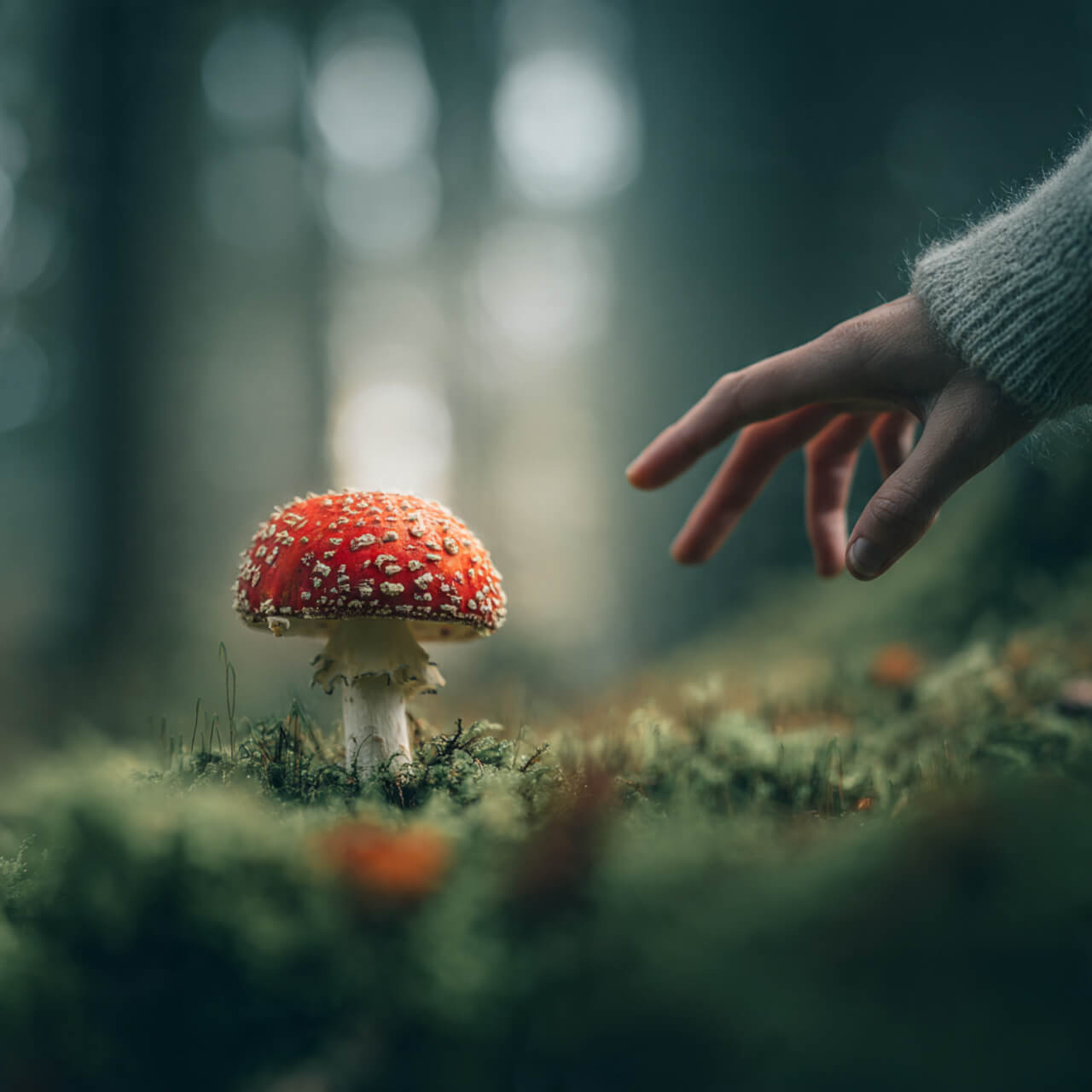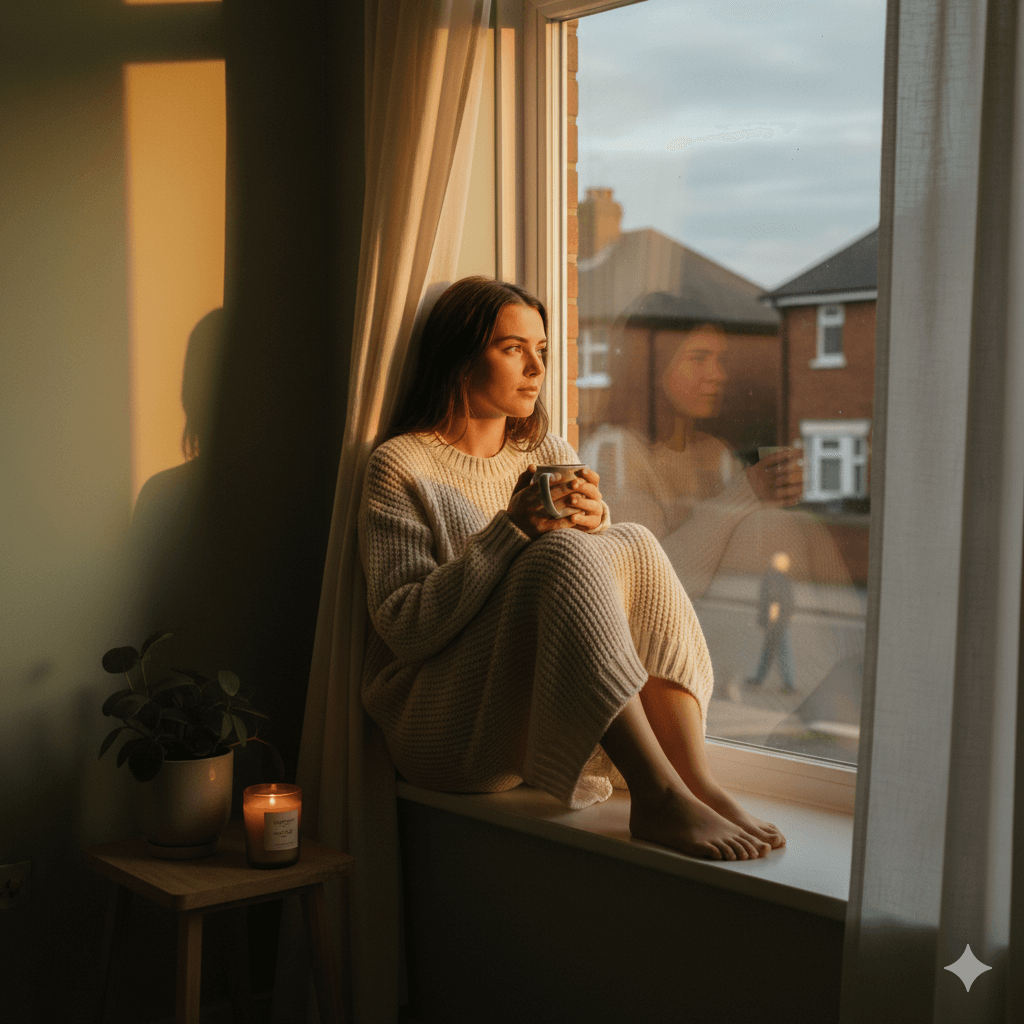Read time: 16 minutes
Quick Summary: Struggling with depression that won’t lift? This comprehensive guide combines gut health, movement, thought work, and community into a science-backed protocol for addressing root causes naturally. Includes research from Harvard Health and Stanford neuroscientist Andrew Huberman, plus a practical 7-day kickstart plan. This protocol ended my 20-year battle with depression – it might help you too.

You’ve Tried Everything. Nothing’s Working. You’re Exhausted.
You show up for friends even when you’re screaming inside. You force smiles at family gatherings while your brain whispers that you’re broken. You’ve read the articles, tried the suggestions, maybe even started therapy or medication.
But the nighttime mental torture still comes. The moment your head hits the pillow, it all floods back – every betrayal, every hurt, every moment you wish you could forget. You lie there replaying it all, wondering: “Why can’t I just let this go? What’s wrong with me?”
You’re exhausted. Not the tired you feel after a long day but the bone-deep weariness of fighting your own mind. And you’re starting to wonder if this is just… who you are now.
I know this exhaustion intimately.
For 20 years, I lived in that exact hell. Every single night, the broken record would start: “He did that to me. She abandoned me. Maybe I deserved it. Maybe I’m just unlovable.”
The critical voices were relentless:
- “You’re not good enough.”
- “You deserved what happened.”
- “Everyone leaves because you’re worthless.”
I refused antidepressants not because they’re wrong, but because something told me numbing the pain wouldn’t fix what was broken underneath.
And I was right.
What If The Mental Torture Could Actually Stop?
Not just “get manageable.” Not just “a little better.” But actually start to become quiet.
Imagine: Your head hits the pillow and instead of the familiar dread, there’s peace. The painful memories are still there, but they don’t grab you by the throat anymore. They’re just… the past.
You wake up without the heaviness and you look in the mirror without hearing the critic. You can think about what happened without spiralling.
This isn’t fantasy. This is my life now.
I sleep peacefully. The nighttime torture ended. The critical voices went quiet. I practice self-compassion instead of self-destruction.
It took 18 months to fully break the 20-year cycle, It wasn’t pills and It wasn’t the traditional talk therapy. It was a four-pillar approach combining gut health, movement, thought work, and forgiveness all backed by science.
And I’m going to show you exactly how I got here.
📌 Key Takeaways:
- Depression often has roots in unprocessed trauma, gut inflammation, and stuck thought patterns
- Natural healing combines nutrition, movement, thought work, forgiveness, and community
- This approach takes months to years, not days – be patient with yourself
- Professional help may still be necessary for severe depression or personality disorders
- You don’t have to do this alone – connection and community are essential
📊 What The Research Shows:
- 40% fewer people feel lonely when they volunteer regularly
- Exercise can be as effective as medication for mild to moderate depression
- People who limit social media to 30 minutes daily see measurable mood improvement
- My symptoms improved noticeably within 3 weeks of changing my diet
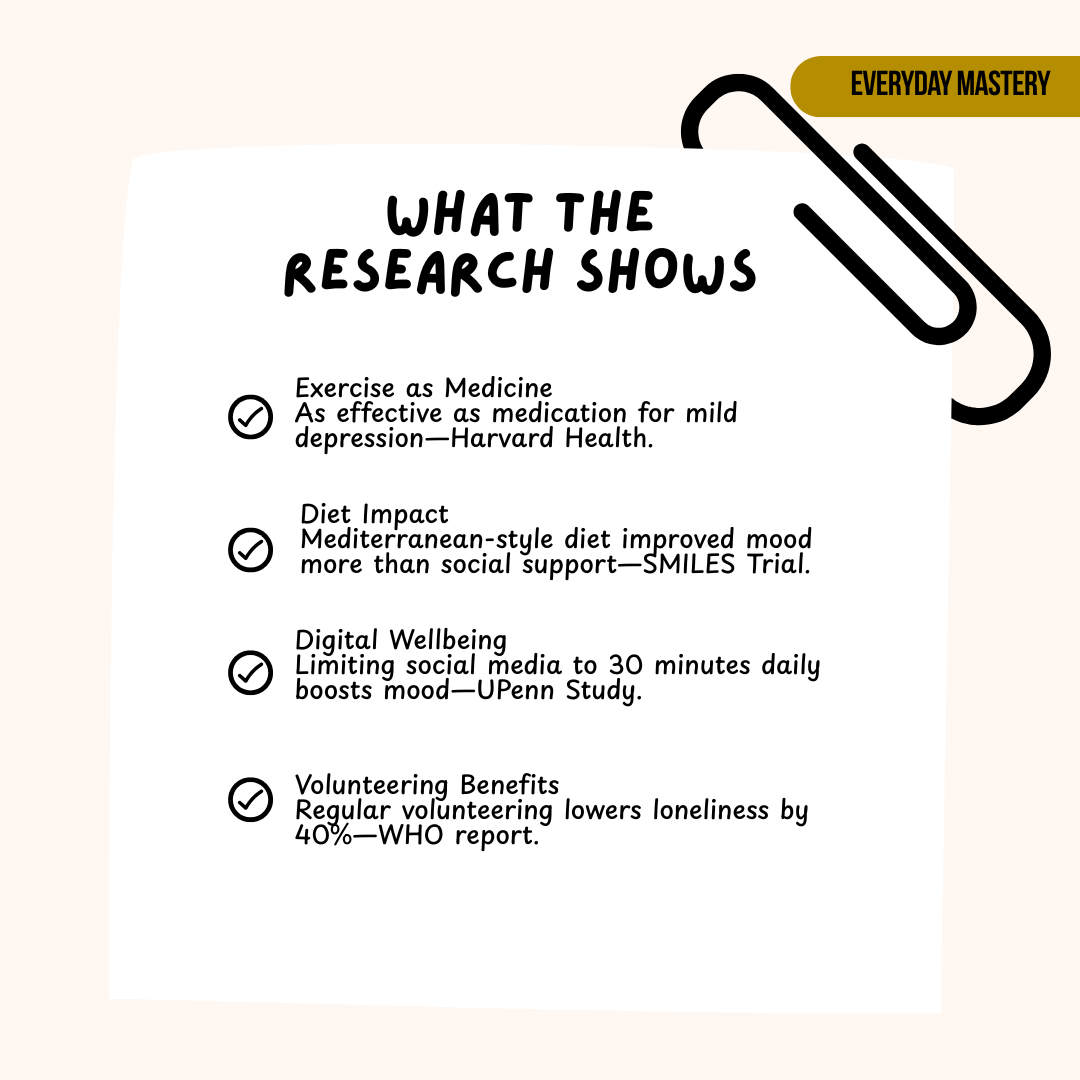
- Here's What Depression Often Looks Like
- What Is Depression Really Caused By?
- Why Antidepressants Weren't My Answer
- The Voices That Nearly Broke Me
- How I Healed Depression Naturally: The 4-Pillar Protocol
- Why Community Matters (Even If You're Not "Social")
- Why This Matters for Depression
- Mr Critic Moment
- Frequently Asked Questions
- Your 7-Day Gentle Kickstart Plan
- Everyday Mastery Steps You Can Take Now
- Your Next 3 Actions
- The Bottom Line: Why You Feel Depressed — and Why It Can Change
Here’s What Depression Often Looks Like
Depression isn’t just sadness. It shows up differently for different people, but some patterns are common:
About 1 in 6 people will experience depression at some point in their life. You’re definitely not alone in this.
Emotional signs:
- Persistent sadness, emptiness, or hopelessness lasting more than two weeks
- Loss of interest in things you used to love
- Irritability, frustration, or angry outbursts over small things
- Feelings of worthlessness or excessive guilt
Physical changes:
- Sleep problems (can’t sleep or sleeping all the time)
- Constant fatigue even after rest
- Appetite changes (eating too much or too little)
- Unexplained aches and pains
Mental fog:
- Trouble concentrating or making simple decisions
- Slowed thinking or movement
- Recurring thoughts of death or suicide
- Nighttime rumination (replaying painful memories on loop)
Important: If these symptoms have lasted more than two weeks and are affecting your daily life, please speak with your GP. Early support makes a real difference.
The funny thing is, depression doesn’t always start with sadness.
Sometimes it begins with silence the quiet kind that creeps in when your body’s been whispering for years that something’s off. And because no one ever taught us to listen, we start blaming ourselves instead of asking what’s really happening underneath.
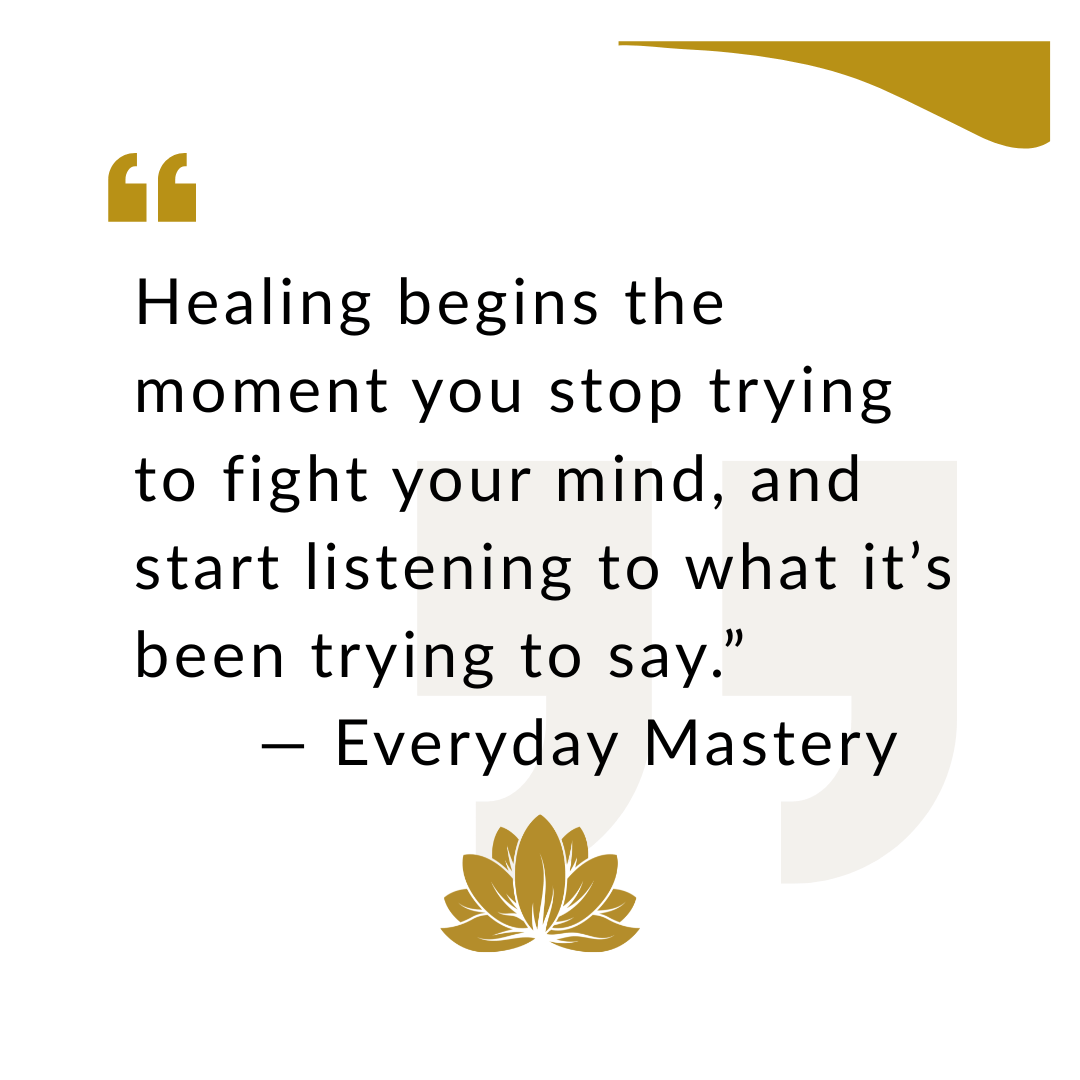
What Is Depression Really Caused By?
Short answer: Depression is rarely just “a chemical imbalance.” A 2022 umbrella review found no clear evidence that low serotonin alone explains depression. Instead, it’s often unprocessed trauma, chronic stress, poor gut health, inflammation, and learned helplessness woven together.
The Brain-Body Connection
Here’s the truth no one explained to me for 20 years:
Your brain cannot tell the difference between remembering trauma and reliving it.
When you recall a painful memory, your body floods with the same stress hormones as if the danger is happening right now. As trauma researcher Dr. Bessel van der Kolk explains in The Body Keeps the Score, “Trauma is not just an event that took place sometime in the past; it is also the imprint left by that experience on mind, brain, and body.”
Research shows trauma recall triggers sharp increases in heart rate, skin conductance, and cortisol as if the threat were present.
Why Trauma Loops in Your Mind
Because your body responds to trauma memories as if they’re happening now, traditional ‘talk therapy’ can sometimes worsen symptoms if done without nervous system calming techniques.
But here’s the breakthrough: when memory processing is paired with body-calming techniques – breathing, mindfulness, gut-supporting nutrition – the brain can finally file those experiences as past events, not present threats.
The Inflammation Connection
Emerging research shows that chronic inflammation in the body – often driven by poor gut health, processed foods, and stress directly affects brain chemistry and mood. When your gut is inflamed, your brain feels it.
Here’s something fascinating: 90% of your body’s serotonin is produced in your gut.
(Serotonin is one of your brain’s key mood regulators – when it’s working properly, you feel calm, content, and able to cope. When it’s low, everything feels harder.)
But gut serotonin doesn’t travel directly to your brain. Instead, it signals your vagus nerve (the communication highway between your gut and brain), which then tells your brain to produce its own serotonin.
This is why gut health isn’t just about digestion – it’s about your mood, your mental clarity, and your ability to feel okay.
Stanford neuroscientist Andrew Huberman explains in his research on serotonin and depression that when you eat fermented foods and maintain healthy gut bacteria, you’re literally signaling your brain to produce more of the chemicals that regulate mood and wellbeing.
Why Antidepressants Weren’t My Answer
If you’ve been offered antidepressants but something deep inside tells you that numbing the symptoms won’t fix the root cause – you might be right.
I’m not against medication. Antidepressants help many people, and combined with therapy and support groups, they play an important role in recovery for millions.
But here’s what doctors don’t always tell you: large studies like STAR*D show that only about one-third of patients reach full remission on the first antidepressant tried, while many still live with ongoing symptoms.
For me, pills weren’t the answer – but that doesn’t mean they’re wrong.
Medication is genuinely lifesaving for many people, and there’s absolutely no shame in needing it.
For some, antidepressants provide the crucial stability needed to do deeper healing work and for others, medication IS the healing.
My path was different. Something told me I needed to address the root causes underneath my symptoms. And two years ago, when I refused gallbladder surgery and chose to heal naturally, I discovered something shocking: – the same steps that healed my body also healed the mental wounds I’d carried for two decades.
If medication is working for you, keep taking it. This approach can work alongside medication – they’re not mutually exclusive. But if you’ve tried medication and it hasn’t been enough, or if something inside tells you there’s more to address, this might be the missing piece.
The Voices That Nearly Broke Me
Here’s what few people tell you about trauma: it doesn’t just hurt once. It moves in, sets up camp, and becomes the critical voice in your head.
For 20 years, I believed those voices were truth. But eventually I realized they weren’t truths about me – they were echoes of damaged people’s actions, bouncing around in my head and pretending to be facts.
The hopeful truth? Our brains are elastic. Neuroscience calls this neuroplasticity: the ability of the brain to form new connections throughout life.
We are, in many ways, the sum of our repeated thoughts. And thoughts can change.
So what’s the alternative? Should trauma define us for the rest of our lives? Or can we reprogram our responses, adopt new beliefs, and create a calmer inner world?
I’ve seen people stuck in trauma stories 60 years later, unable to let go. That’s the cost of leaving the brain unchallenged.
For me, the only real path forward was to retrain my brain, build new patterns, and finally find peace.
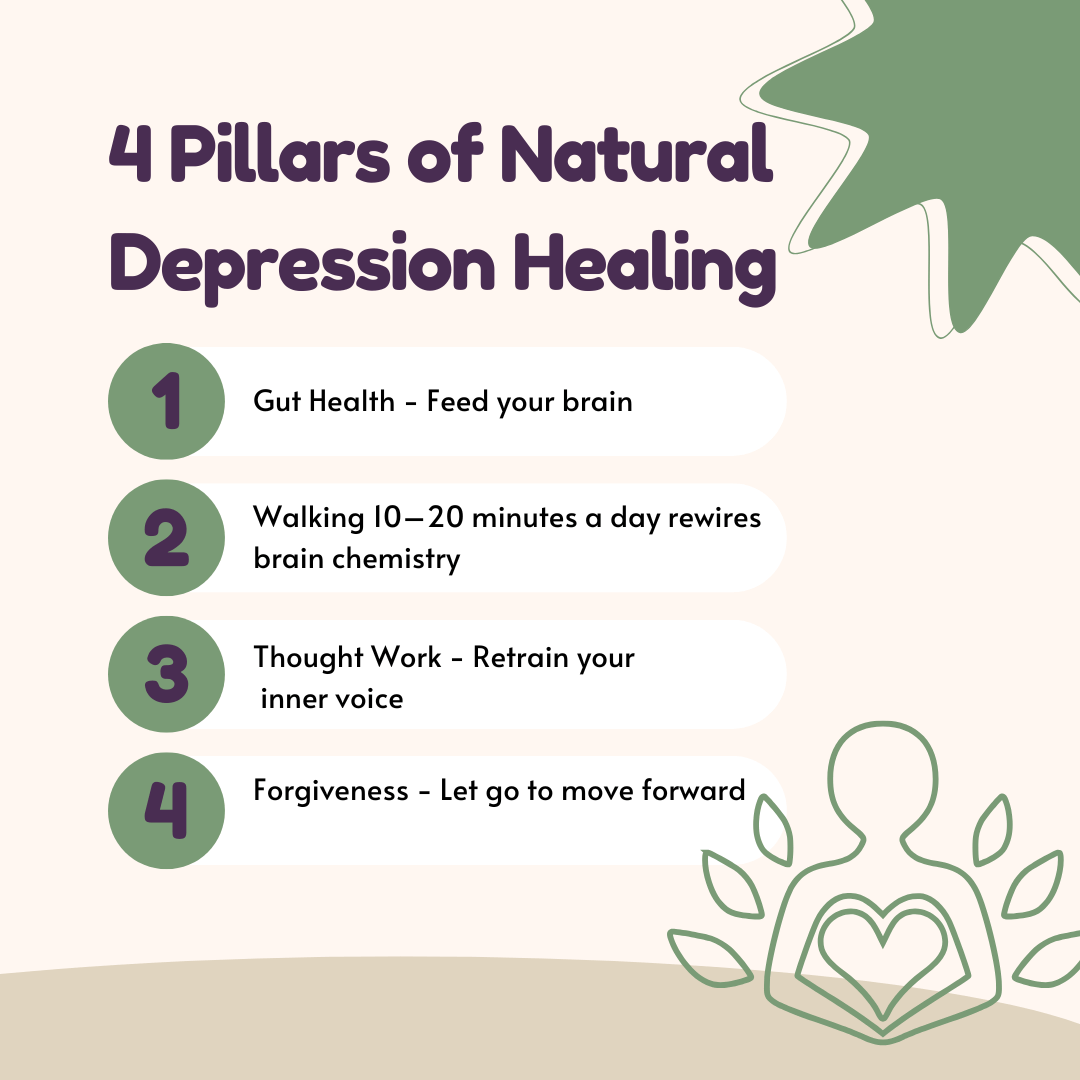
How I Healed Depression Naturally: The 4-Pillar Protocol
Short answer: Healing depression naturally requires addressing four areas: nutrition (especially gut health), daily movement, thought pattern retraining, and radical forgiveness. These work together to calm your nervous system and process trauma properly.
When I started healing my gallbladder naturally, something unexpected happened: as I fed my gut with whole foods, moved my body daily, and calmed my nervous system with meditation, the nighttime torture began to fade.
Not because I was avoiding memories. Because I was processing them properly for the first time.
Here’s what worked:
Pillar 1: I Fed My Brain Real Food
As explained earlier, your gut and brain are directly connected. Poor gut health fuels inflammation, which drives depression. The SMILES trial found that a Mediterranean-style diet improved depression symptoms more than social support alone.”
If you want to understand the deeper science behind how gut health affects mental health, Homosapien Health has an excellent breakdown of the gut-brain connection and why food matters for depression.
Within 3 weeks of eating this way, I noticed my mood was more stable. The constant background anxiety started to quiet. It wasn’t magic – it was my body finally getting what it needed to function properly.
What I did:
- 80% whole foods (the same approach that healed my gallbladder)
- Fermented foods daily (sauerkraut, kimchi, low-sugar yogurt, kefir) – research shows 1-4 servings per day supports healthy gut bacteria and mood regulation
- Tryptophan-rich foods (turkey, quality dairy, nuts) – your body converts this amino acid into serotonin
- Eliminated processed, inflammatory foods
- Stayed hydrated
Simple additions that help: Omega-3 rich foods (fatty fish, walnuts, flaxseed), leafy greens, and foods high in B vitamins support brain health naturally. Harvard research also emphasizes cutting refined sugar, which can trigger emotional highs followed by extreme lows that worsen depression symptoms.
Pillar 2: I Moved My Body Daily
Movement isn’t punishment – it’s medicine. Research shows that exercise changes brain chemistry naturally, without pills.
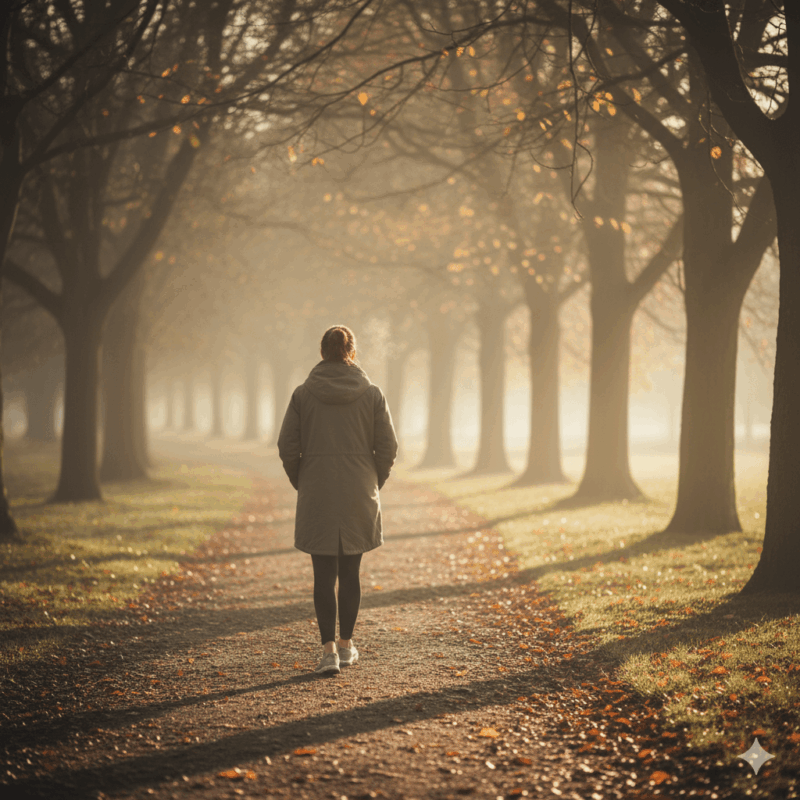
Here’s what happens when you move: your brain produces more feel-good chemicals and creates something called BDNF (think of it as fertilizer for your brain cells). This helps your brain form new connections and regulate emotions better. Even 20-30 minutes of walking or simple strength training can trigger these changes.
Harvard Health notes that regular exercise is one of the most effective non-drug approaches to depression, with aerobic exercise showing especially strong antidepressant effects when done for 45 minutes, three times per week.
But here’s the thing: you don’t need to do 45 minutes to see benefits. Even 10-20 minutes of daily movement made a difference for me. Start where you are.
What I did:
- Strength training for resilience
- Walks in nature for calm
- Consistent daily movement, even when I didn’t feel like it
💡Why sleep matters: I also prioritized sleep hygiene – same bedtime, dark room, no screens before bed. Poor sleep and depression feed each other. Breaking the cycle by protecting your sleep is crucial.
Pillar 3: I Retrained My Thought Patterns
This was the hardest part. When the old voices started:
“We’ve been over this. It’s past.”
I learned to:
- Feel the emotion
- Name it
- Store it in the “past drawer”
- Use breath and gratitude to replace poison with presence

A practical technique that helped: the daily thought dump
When your brain is racing and thoughts are overwhelming please try this:
- Write everything down. All of it. Every worry, fear, criticism, replay – get it out of your head and onto paper.
- Tell yourself: “These thoughts are written down now. I’m listening. I’ll deal with them later.”
- Set aside 10 minutes each day to review what you wrote. Not more – just 10 focused minutes.
- For each thought, ask three questions:
- Do I have control over this?
- Is action required?
- If not, can I let this go for today?
This stops the mental loops because your brain knows you’re not ignoring the thoughts, you’ve scheduled time to address them. You’re in control now, not them.
I also noticed that the restless urge to scroll was part of my quiet mental loop. Studies now show limiting social media to around 30 minutes per day is linked with better mood and fewer feelings of loneliness.
If you’d like to explore how to reset your screen habits and reclaim your attention, see my short guide, How to Do a Digital Detox That Actually Sticks on Everyday Mastery.
When your brain gets loud: find your calming sound
Some people swear by meditation music or nature sounds. Others find it irritating. The key is finding what works for YOU.
Try different options:
- Meditation music or binaural beats
- Rain or ocean sounds
- Instrumental music (classical, lo-fi, ambient)
- White noise or brown noise
- Complete silence
There’s no “right” answer. If meditation music helps you calm your nervous system, use it. If it doesn’t, don’t force it – find your own go-to sound (or silence) that genuinely soothes you.
Remember: these thought patterns may have been wiring themselves in your brain for years – maybe decades. They won’t disappear overnight. Rewiring your brain takes time, repetition, and patience. You’re not broken if it feels slow.
If you’re struggling to release painful memories and move forward, learning how to let go of the past can help you process trauma and create new, healthier patterns without staying stuck in what happened.
Pillar 4: I Practiced Radical Forgiveness

This was the hardest – and most powerful – pillar.
But let’s be clear about what forgiveness actually means here.
Forgiveness doesn’t mean:
- What they did was okay
- You have to let them back into your life
- You have to forget what happened
- You’re weak for “letting them off the hook”
Forgiveness means releasing the emotional grip that person or event has on you. It means choosing your own peace over the punishment you wish they’d receive. It means deciding that carrying this pain isn’t serving you anymore.
Research shows that when you genuinely forgive (not just say the words, but truly let go), your brain physically changes. The neural pathways that kept replaying trauma start to quiet. Your stress hormones drop. You literally release emotional energy that’s been trapped in your body.
Forgiveness is NOT the same as reconciliation.
I forgave my ex who head-butted me. We even hug at parties now – but that’s MY choice, and it took years. You can forgive someone and never speak to them again. Both are valid.
I forgave the man who violated my trust. I haven’t seen him in years, and I don’t need to. Forgiveness happened inside me, not between us.
Most importantly, I forgave myself. For staying too long and for or not seeing the signs. For all the ways I blamed myself for what others chose to do to me.
If “forgiveness” feels impossible or triggering for you, try different language:
- I’m choosing to release the grip this has on me
- This weight is too heavy to carry anymore”
- My peace matters more than their punishment
- Moving forward is possible now
And here’s the truth: you might not be ready yet. And that’s okay.
Forgiveness isn’t something you force. It’s something that becomes possible when you’ve done the other work – when your nervous system is calmer, when your gut is healthier, when your thought patterns have shifted. For me, forgiveness came 12-15 months into the process, not at the beginning.
If you’re not ready to forgive, don’t. Just notice the weight of carrying unforgiveness, and stay open to the possibility that one day, you might choose to put it down.
Not for them. For you.
Why Community Matters (Even If You’re Not “Social”)
Here’s something I didn’t expect: healing in isolation is nearly impossible.
The World Health Organization recently reported that 1 in 6 people globally experience loneliness – and it’s linked to 871,000 deaths annually. Loneliness isn’t just painful; it’s dangerous. It increases depression risk and makes recovery harder.
But here’s the hope: even small, regular social connections make a measurable difference.
I’m not talking about forcing yourself to be social if that’s not you. I’m talking about the simple act of not being completely alone with your thoughts.
Research, including findings from Harvard Health, confirms that social isolation increases depression risk and makes symptoms more severe and longer-lasting. Even small, regular social connections make a measurable difference.
One study found that people who joined groups or volunteered just once a week saw their depression symptoms improve as much as those taking medication – but without the side effects.
For me, community looked like:
- Volunteering where I met people working toward something meaningful
- One or two trusted friends I could text when the voices got loud
- Online spaces where people understood what I was going through
- Even just being around others without having to perform or explain
Depression thrives in isolation. It tells you that you’re uniquely broken, that no one would understand, that you should hide. But when you connect – even in small ways – that lie loses power.
If you’re feeling lonely alongside your depression, this post on why loneliness happens and how to reconnect explores the connection between isolation and mental health. Sometimes depression and loneliness feed each other, and breaking one cycle helps break the other.
You don’t need a huge friend group. You just need to not be completely alone.
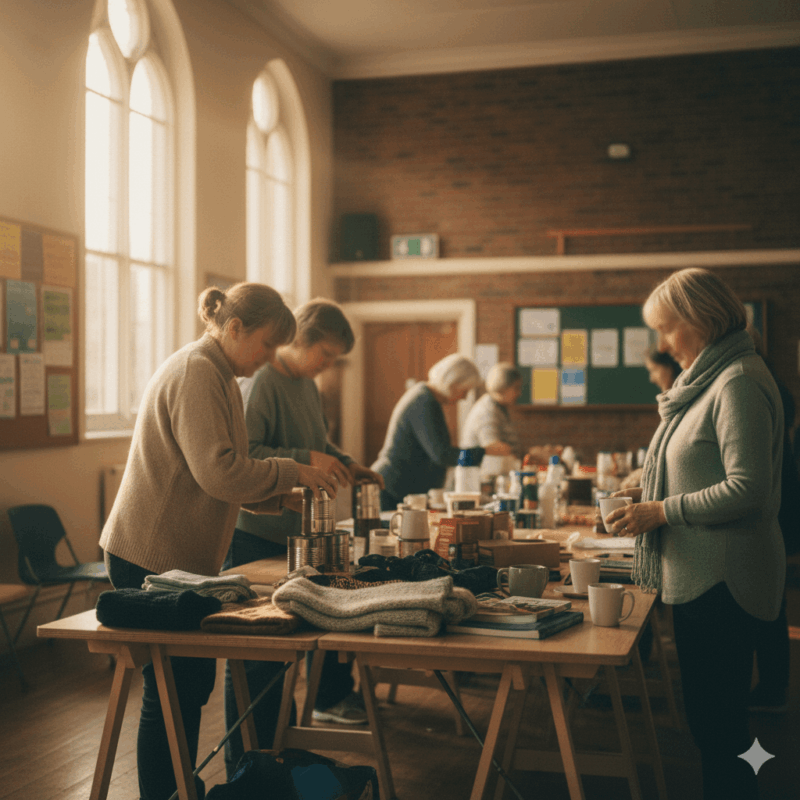
Why This Matters for Depression
Here’s what I learned: depression is complicated. Genetics, biology, trauma, stress, gut health, learned patterns – they all weave together differently for each person.
My depression was rooted in unprocessed trauma and chronic stress. Your depression might have different causes. That’s why what worked for me might not work exactly the same for you – and that’s okay.
Antidepressants help many people manage symptoms, and for some, that’s exactly what’s needed. But here’s what I noticed: medication often addresses symptoms rather than root causes. That’s why some people stay on antidepressants for years or even decades without full resolution.
This doesn’t make medication wrong. It just means healing might require addressing what’s underneath – the unprocessed trauma, the gut inflammation, the stuck thought patterns, the lack of movement.
For me, addressing those root causes changed everything. But I’m not a doctor, and this is just my experience.
Mr Critic Moment

They don’t like you anyway,” he mutters. “Why bother reaching out? You’ll only make it awkward.”
Sometimes he’s a clear voice like this, quick, certain, and quietly cruel. Other times he’s not a voice at all, just a tightening in your chest or that heavy pull to withdraw. Whatever form he takes, he’s only trying to keep you safe from rejection, he just doesn’t realise that hiding hurts more in the long run.
Next time you notice that feeling or voice, try answering softly: “Maybe you’re wrong. Maybe someone out there is waiting for this message
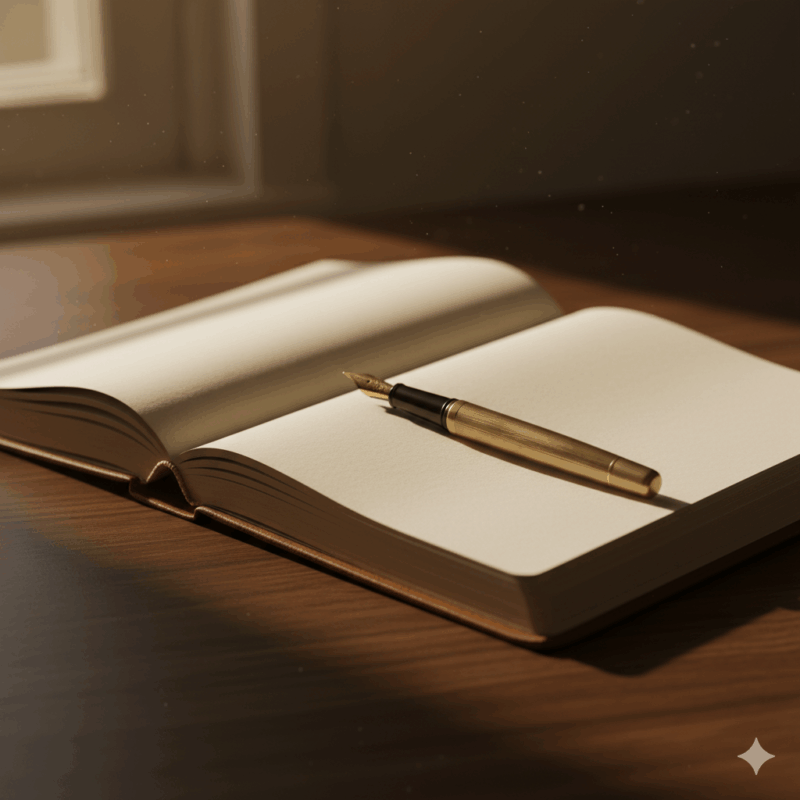
Journalling Prompt:
When do doubt or disconnection tend to show up for you?
If it’s a voice, what does it say — and how could you answer kindly?
If it’s just a feeling, what helps it soften, even a little?
Frequently Asked Questions
Can you really heal depression without medication?
For some people, yes – especially when depression stems from unprocessed trauma, poor gut health, and chronic stress rather than purely biological factors. However, this approach isn’t appropriate for everyone.
If you have bipolar disorder, personality disorders, or other complex mental health conditions, you need specialized professional treatment. Self-help strategies alone are not sufficient for these conditions.
For trauma-based depression like mine, addressing root causes made the difference. But medication can be life-saving for many, and there’s no shame in needing it.
How long does it take to heal depression naturally?
There’s no single timeline, and anyone who promises one is lying to you. For me, noticeable shifts began within weeks of changing my diet and movement, but deep healing took months and years. The nighttime torture faded gradually, not overnight.
Here’s what I noticed:
- Weeks 1-3: Slightly more energy, less brain fog
- Months 1-3: Nighttime loops started getting shorter and less intense
- Months 6-12: Mood felt more stable day-to-day
- 18 months: The constant mental torture finally stopped
Healing isn’t linear. You’ll have good days and setbacks. Some weeks you’ll feel hopeful, others you’ll wonder if anything’s working. That’s all normal. Keep going anyway.
The question isn’t “how long” – it’s “are you moving in the right direction, even slowly?”
Can depression go away on its own?
Sometimes situational depression (triggered by a specific event like grief or job loss) can improve with time as circumstances change. However, clinical depression – especially when rooted in trauma, biological factors, or chronic stress – typically doesn’t resolve without intervention.
Even “mild” depression can become chronic if left unaddressed. The good news? With the right combination of approaches – whether natural methods, therapy, medication, or all three – depression is treatable. You don’t have to wait and hope it passes on its own.
Is my depression severe enough for medication?
Only a healthcare provider can answer this, but here are signs that professional help is urgent:
- Suicidal thoughts or plans
- Inability to function in daily life (can’t work, care for yourself, maintain relationships)
- Symptoms lasting more than a few weeks with no improvement
- History of bipolar disorder or other mental health conditions
If you’re unsure, err on the side of caution and speak with your GP. There’s no shame in needing medication – it can be life-saving and provide the stability needed to do deeper healing work.
What if I’ve tried everything and nothing works?
Don’t Give Up on Finding Support
If you’ve tried medication, therapy, and lifestyle changes without relief, please keep seeking support. Sometimes healing requires the right combination of approaches, not just one method alone.
And please don’t isolate yourself. Depression wants you alone, but healing happens in connection – even small, imperfect connection. Work with professionals who understand trauma-informed care, and consider finding a support group (online or in-person) where you don’t have to explain yourself.
You’re not broken. You just haven’t found your path yet. Keep trying.
Your 7-Day Gentle Kickstart Plan
Let’s be clear: you won’t “fix” depression in 7 days. This isn’t a cure – it’s a beginning.
Think of this as a gentle introduction to the 4 pillars. A way to dip your toes in without overwhelming yourself. Real healing took me months and years, not days. But everyone needs a starting point, and this is yours.
You don’t have to do everything at once. This plan introduces one small shift each day, building on what came before. Be kind to yourself – some days will feel easier than others, and that’s okay.
Day 1: Just Notice
Today, you’re not fixing anything – just observing. That’s enough.
- Notice when your inner critic appears. What does it say?
- If nighttime thought loops start, try saying aloud: “This is a memory, not happening now. This is just my depression talking.”
- Write down anything that triggered difficult thoughts today.
No pressure. No judgment. Just awareness. You’re taking the first step, and that matters.
Day 2: Feed Your Gut One Good Meal
Start small with one whole-food meal.
- Eat something gut-friendly: vegetables, whole grains, fermented foods (sauerkraut, kimchi, low-sugar yogurt, kefir).
- Add a source of tryptophan (turkey, nuts, quality dairy) – your body needs this to make serotonin.
- Skip processed foods just for today.
- Drink plenty of water.
Notice how your body feels after eating real food versus processed food. Your gut is literally communicating with your brain through every meal.
Day 3: Move for 10 Minutes
Movement isn’t about punishing yourself – it’s about feeling alive.
- Walk outside for 10 minutes, or do light stretching at home.
- Focus on consistency, not intensity.
- Notice: does movement shift your mood, even slightly?
Even 10 minutes counts. If fear or resistance is holding you back from starting new habits, understanding how to overcome fear of change can help you take those first small steps without overwhelm.
Day 4: Challenge One Thought
When the critical voice speaks today, pause.
Remember: these thought patterns may have been wiring themselves in your brain for years – maybe decades. They won’t disappear overnight. Rewiring your brain takes time, repetition, and patience. You’re not broken if it feels slow.
- Label the emotion: “I’m feeling shame” or “I’m feeling worthless.”
- Ask: “Is this actually true, or is trauma talking?”
- Use breath: in for 4, hold for 4, out for 6.
- Write down one critical thought and question whether it’s fact or fear.
You’re retraining your brain, one thought at a time. Be patient with yourself.
Day 5: Try Forgiving Someone (Even Yourself)
This is the hardest day, so be gentle.
- Think of one person you’re still angry at – maybe even yourself.
- You don’t have to forget what happened. Just practice releasing the grip it has on you.
- If it helps, write a forgiveness letter you never send.
Forgiveness isn’t for them. It’s for you.
Day 6: Put It All Together (And Reach Out)
Today, combine everything you’ve practiced:
- Eat one gut-friendly meal.
- Move for 10 minutes.
- Notice your thoughts and challenge one.
- Practice a moment of forgiveness or self-compassion.
- Reach out to one person. Text a friend, call a family member, join an online support group, or just be around others (a café, library, park).
Notice: are the nighttime loops quieter? Is your mood lighter, even a little? Do you feel less alone?
Community doesn’t have to mean parties or big social events. It can be as simple as not being completely isolated with your thoughts.
Day 7: Reflect and Decide What’s Next
You made it through the week. That’s huge. Celebrate that.
But this is just the kickstart. Real healing takes longer – weeks, months, sometimes years. That’s normal and okay. Some days you’ll feel progress. Other days you’ll feel like you’re back at square one. Both are part of healing.
- What felt good this week and What was hard?
- Which practices do you want to keep doing?
- What needs more time or support?
- Can you celebrate one small win from this week?
This isn’t the end – it’s just the beginning. Decide which practices feel sustainable and commit to continuing them beyond this week.
You don’t have to do this alone. If you need deeper support, reach out to your GP or a therapist. There’s no shame in needing help – it’s actually one of the bravest things you can do.
Everyday Mastery Steps You Can Take Now
These aren’t big moves — just small, realistic shifts you can try today.
Notice what’s already there.
Write down one small connection from today — a smile, a wave, a chat. You’re already doing more than you think.
Move toward warmth.
Spend ten minutes somewhere you can be around others — a café, park bench, library. Let your body remember the feeling of “around people.”
Check your critic.
When that inner voice says, “This doesn’t count,” pause and reframe: every act of reaching out counts, even the quiet ones.
Your Next 3 Actions
Do these today:
Smile at three people.
Text one person you haven’t spoken to in months.
Do one small kindness with no expectation in return.
That’s it. Start there.
The Bottom Line: Why You Feel Depressed — and Why It Can Change
You’re not broken for feeling depressed.
Medication hasn’t worked or therapy hasn’t been enough? You’re not failing.
Can’t just “think positive” your way out of this? You’re not weak.
You’re just human. And depression is part of the human experience for millions of people.
But here’s what you can do:
Stop expecting a single solution to fix everything, there’s no perfect treatment. Stop beating yourself up for still struggling.
Start with one small shift.
One whole-food meal. Ten minutes of movement. One thought challenged with compassion. One moment of forgiveness – even for yourself.
These won’t fix everything overnight. They won’t take away all the pain or erase the past.
But they might – just might – be the beginning of something that finally works.
I can’t promise this approach will heal you the way it healed me. Everyone’s depression is different. Everyone’s path is different.
But if you’ve tried everything else and you’re still here, reading this, looking for answers – what have you got to lose by trying?
Seven days. That’s all I’m asking. Give your body, your gut, your brain seven days to see if this feels different.
If it doesn’t help, you’ve lost nothing. But if it does… you might just find the path I found.
One Question for You
What’s one tiny moment today that reminded you you’re part of something — even for a second?
Scientific Sources
This post draws on peer-reviewed research on depression, trauma, and holistic healing:
Antidepressants and recovery: The STAR*D trial showed only about one-third of people reach full recovery after the first antidepressant.
Food and mood: The SMILES trial found a Mediterranean-style diet improved depression more than social support alone.
On the gut-brain serotonin pathway: Stanford neuroscientist Andrew Huberman explains how gut health impacts brain serotonin production through the vagus nerve. His Huberman Lab offers science-backed protocols for mental health and wellbeing.
On nature and stress: Studies show that spending 10-20 minutes in nature (a “nature pill”) significantly lowers cortisol levels.
About Everyday Mastery
Everyday Mastery blends science, mindfulness, and small daily actions to help you build habits that last.
Found this helpful? You can buy me a coffee to support more writing like this. Every cup helps me keep creating resources
⚠️ Important Medical Disclaimer:
This article is based on my personal experience and peer-reviewed research. It is not medical advice and won’t work for everyone. I’m not a doctor, and depression is complex. What helped my trauma-based depression may not work for yours.
This approach is not suitable for everyone—particularly those with bipolar disorder or personality disorders (see FAQ for details). Always consult your GP before making changes to your mental health treatment.
If you’re struggling, please see your GP. Call the Samaritans (116 123) if you’re in crisis, or go to A&E if you’re at risk.
Antidepressants can be life-saving and help many people manage symptoms. However, they often address symptoms rather than root causes, which is why some people stay on them for years or decades without full resolution. My approach worked for me by addressing underlying causes – but it should complement, never replace, professional medical care.
Kel is the writer behind Everyday Mastery, where she shares the real, messy, and meaningful process of building habits, resilience, and self-belief from the ground up. Her writing blends ancient philosophy with modern science, always focused on small, practical steps that lead to lasting



